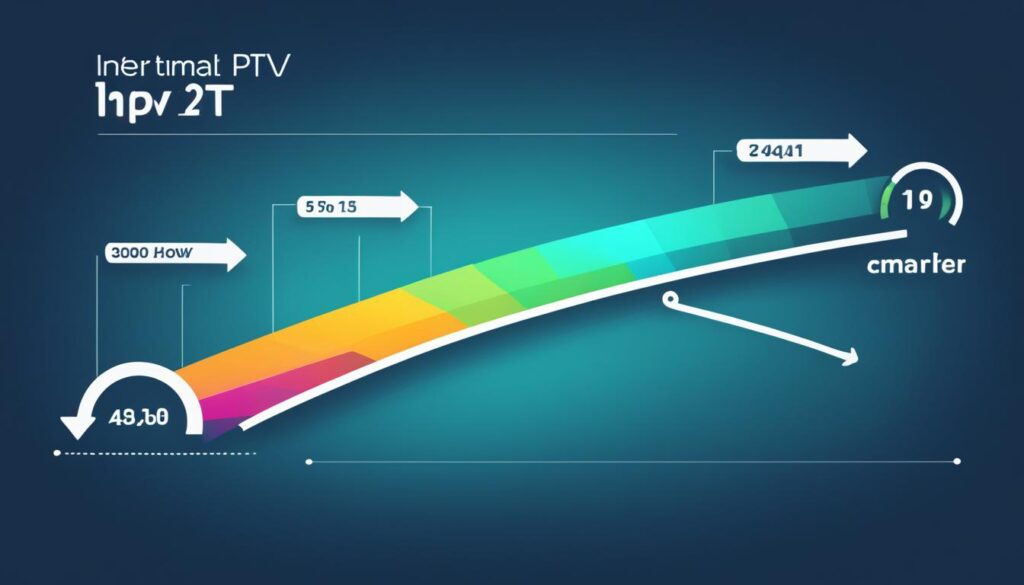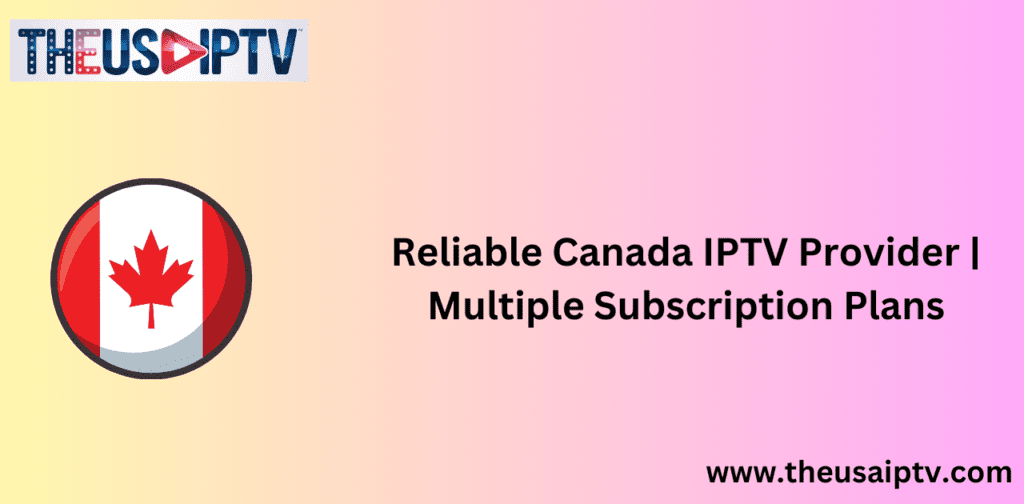The growing popularity of Canada IPTV services has revolutionized the entertainment landscape, delivering an extensive range of viewing options directly to users’ fingertips. However, the quality of this advanced viewing experience is highly dependent on internet connection speeds that can efficiently handle the demands of streaming data. Since internet speed directly impacts IPTV performance, securing a robust network is essential to achieving streaming reliability. At https://theusaiptv.com/, we are dedicated to providing audiences with the finest in home entertainment, ensuring a seamless, buffer-free experience—provided that your internet connection meets the necessary standards.
To fully engage with the high-definition world of online television, it is crucial to understand the fundamental aspects of your internet connection. Whether you are indulging in marathon viewing sessions of your favorite shows or tuning in for live sporting events, interruptions caused by insufficient speeds can significantly disrupt your experience. For standard definition streams, a minimum of 3 Mbps is required, while enjoying crisp 4K Ultra HD content calls for an internet speed of at least 25 Mbps.
Achieving a smooth and dependable IPTV experience begins with a solid technical foundation. By conducting regular internet speed tests, utilizing a wired Ethernet connection for enhanced stability, and securing your network from interference or breaches, you can easily attain flawless streaming performance. Let us explore the key internet requirements and examine how to optimize your home entertainment system for peak functionality.
Key Takeaways
- A stable internet connection is critical for delivering high-quality Canada IPTV services.
- Optimal speeds are necessary to avoid buffering and ensure consistent streaming performance.
- Higher video resolutions demand proportionally higher internet speeds.
- Regularly testing your connection is a practical measure to eliminate buffering issues.
- A secure and well-configured network enhances uninterrupted IPTV streaming.
Understanding the IPTV Framework in Canada

As IPTV services continue to flourish across Canada, delivering a seamless streaming experience is contingent upon a strong framework that considers both bandwidth requirements and network latency. IPTV performance is not solely about securing enough bandwidth but also ensuring connection quality and maximizing the efficiency of the home network.
Canadian users require a stable, high-speed internet connection to meet the demands of IPTV streaming. For HD content, a minimum of 10 Mbps is recommended, whereas streaming in 4K Ultra HD necessitates at least 25 Mbps to guarantee smooth, uninterrupted playback.
Network latency, often an overlooked factor, plays a pivotal role in IPTV streaming performance. It is not just about how quickly data is transmitted but how swiftly the network responds to streaming requests. Lower latency minimizes buffering and facilitates a smoother content delivery process. Tools such as ping tests offer valuable insights into network latency and help users identify and address potential inefficiencies in their setup.
| Resolution | Minimum Bandwidth Required | Recommended Network Latency |
|---|---|---|
| Standard Definition (SD) | 5 Mbps | |
| High Definition (HD) | 10 Mbps | |
| 4K Ultra HD | 25 Mbps |
Optimizing home network infrastructure is equally crucial in enhancing IPTV performance. Utilizing a dual-band router equipped with MU-MIMO technology is highly recommended, as it allows multiple devices to stream simultaneously without the interference typically associated with single-band routers. Furthermore, understanding Wi-Fi frequency bands is essential, as the 5 GHz band provides faster data transmission—making it ideal for IPTV streaming.
By addressing bandwidth and latency considerations, Canadian users can optimize their home networks to deliver a superior television viewing experience. A meticulous approach to network setup, alongside selecting reputable ISPs and high-quality equipment, is key to unlocking the full potential of IPTV services available at https://theusaiptv.com/.
Internet Connectivity: The Backbone of Streaming
In the digital age, IPTV box network connectivity has become a critical factor in streaming content across Canada, linking audiences to a broad world of entertainment at the push of a button. Managing and understanding this connectivity is essential to ensure viewers enjoy seamless and uninterrupted content delivery.
Why Your Connection Speed Matters for IPTV
When streaming via IPTV, any delay or disruption in connectivity can significantly compromise the user experience. Ensuring that your IPTV box is supported by a fast and stable internet connection is essential to eliminate buffering and enable high-quality streams, such as HD and 4K UHD, which require substantial bandwidth.
Speed is the foundation of reliable IPTV streaming. A slow internet connection results in data flow interruptions to the IPTV box, leading to video freezing, pixelation, and decreased overall quality—issues that no viewer should encounter.
Assessing Internet Speeds in Different Regions of Canada

Canada’s vast geography creates disparities in internet speeds across regions. While urban centers tend to benefit from faster and more consistent internet due to advanced infrastructure, rural areas may face challenges with speed and reliability. These regional discrepancies can have a notable impact on IPTV performance.
The table below illustrates the variation in average internet speeds across Canada:
| Region | Standard Definition (3-5 Mbps) | High Definition (5-10 Mbps) | Ultra High Definition (25+ Mbps) |
|---|---|---|---|
| Atlantic Provinces | ✔️ | ✔️ | ✖️ |
| Quebec | ✔️ | ✔️ | ✔️ |
| Ontario | ✔️ | ✔️ | ✔️ |
| Prairie Provinces | ✔️ | ✔️ | ✔️ |
| British Columbia | ✔️ | ✔️ | ✔️ |
| Northern Territories | ✔️ | ✖️ | ✖️ |
Testing your internet speed is an essential step in addressing connectivity concerns, regardless of your location. Conducting multiple speed tests at different times of day provides a comprehensive picture of your connection’s stability and can help pinpoint performance issues.
Optimizing Your Network for Enhanced IPTV Performance
To achieve peak IPTV performance, optimizing your home network is critical. As the demand for high-definition streaming grows, your network must be capable of sustaining a consistent data flow. Below, we outline key strategies for upgrading your router and configuring your setup to maximize performance.
Selecting the Right Router for Superior Streaming
Upgrading to a high-performance router can significantly improve your IPTV streaming experience. Look for models that offer strong Wi-Fi signal strength, dual-band capability, and Quality of Service (QoS) settings to effectively manage bandwidth allocation. A powerful router ensures stable, high-speed connections necessary for uninterrupted HD or 4K streaming.
Advanced routers with QoS capabilities can prioritize IPTV traffic, granting streaming services the necessary bandwidth even during periods of high network usage. In short, investing in a premium router enhances your ability to deliver a smooth and reliable IPTV experience.
Wired vs. Wireless: Best Practices for Reliable IPTV Connections
While Wi-Fi offers convenience, Ethernet connections provide unmatched stability for IPTV streaming. Connecting your IPTV box directly to your router using an Ethernet cable guarantees consistent speeds and minimizes interference, especially critical for data-intensive 4K UHD streams.
In cases where Ethernet cabling is not feasible, powerline adapters present a strong alternative. By utilizing your home’s electrical wiring, these adapters create a stable and reliable network that approximates the performance of a wired Ethernet connection—ideal for maintaining a clean and cable-free living space.
Ultimately, optimizing your home network by upgrading hardware and making smart connectivity choices is key to achieving a superior IPTV experience.
Canada IPTV Services and Required Internet Performance
A smooth IPTV experience requires proactive steps to address common streaming issues such as buffering. These interruptions not only detract from your viewing pleasure but also indicate underlying network deficiencies. A fast, stable internet connection is crucial for sustaining high-quality, uninterrupted IPTV streaming.
The type of content being streamed will dictate the necessary internet speed. As shown below, the requirements vary based on the resolution:
| Content Quality | Minimum Internet Speed |
|---|---|
| Standard Definition (SD) | 10 Mbps |
| High Definition (HD) | 25 Mbps |
| 4K Ultra HD | 50 Mbps |
Households with multiple devices streaming simultaneously may experience network congestion, leading to buffering and reduced quality. Utilizing your router’s Quality of Service settings can alleviate these issues by prioritizing IPTV traffic and maintaining uninterrupted playback.
To preserve your IPTV device’s optimal performance, regularly check for firmware updates and ensure that your hardware meets the service provider’s minimum specifications. For additional resources on enhancing your IPTV experience, visit https://theusaiptv.com/.
Maximizing Quality: Adjusting Settings for Optimal IPTV Experience

A fast internet connection alone does not guarantee an exceptional IPTV experience. To fully optimize streaming quality, additional configuration of your devices and network is required. By adjusting settings such as Quality of Service and maintaining your IPTV box, you can greatly improve streaming performance.
Fine-Tuning Your IPTV Box Settings
Ensure your IPTV box is running the latest software version, as updates often include performance enhancements and security improvements. Adjust video resolution and bitrate settings according to your connection’s capabilities to prevent unnecessary buffering and achieve smooth playback. These simple but essential steps help maintain a consistent and high-quality viewing experience.
Network Tweaks to Accommodate Higher Video Quality
Fine-tuning your router’s Quality of Service settings can significantly enhance streaming quality. By prioritizing IPTV traffic, you ensure that your streaming devices receive the bandwidth they need—even during peak usage times. Taking full advantage of your router’s traffic management tools will help maintain stable and superior video quality.
Proactive device and network management is critical to delivering an exceptional IPTV experience. For further guidance on optimizing your IPTV service, visit https://theusaiptv.com/.
Conclusion
In conclusion, providing an outstanding IPTV experience in Canada hinges on understanding how internet speed and network configuration directly impact streaming quality. Knowing the specific bandwidth requirements for different resolutions—from standard definition to the ultra-sharp clarity of 4K Ultra HD—is fundamental to avoiding common streaming pitfalls.
Optimizing your network setup, selecting a high-quality router, and securing a strong Wi-Fi signal are essential steps in elevating your IPTV performance. A comprehensive approach to refining your home network will ensure you experience smooth, high-definition streaming with minimal disruptions.
For further assistance in optimizing your IPTV configuration and maximizing entertainment quality, visit https://theusaiptv.com/. Take charge of your home streaming experience and unlock the full potential of premium IPTV content today.
FAQ
How does internet speed influence IPTV quality in Canada?
Internet speed plays a critical role in determining the reliability and quality of IPTV services. Insufficient speeds lead to buffering, lower video resolution, and frequent interruptions, while faster speeds enable seamless, high-quality streaming.
What are the bandwidth requirements for IPTV streaming performance?
Bandwidth needs vary by resolution: Standard Definition (SD) requires 3-5 Mbps, High Definition (HD) requires 10-15 Mbps, and 4K Ultra HD demands a minimum of 25 Mbps for optimal performance.
How can I measure network latency affecting IPTV in Canada?
Network latency can be measured using online ping test tools, which help assess response times and identify potential delays affecting IPTV streaming performance.
Why does my connection speed matter for IPTV?
A fast and stable internet connection ensures your IPTV box receives data efficiently, preventing buffering and ensuring a seamless viewing experience.
How do internet speeds differ in various regions of Canada, and how does that affect IPTV?
Internet speeds can vary significantly between urban and rural regions. Urban areas typically offer faster and more stable connections, whereas rural regions may experience slower speeds, impacting IPTV reliability and video quality.
What router features should I look for to enhance my IPTV streaming experience?
Select a router with robust signal strength, dual-band capability, and advanced features such as Quality of Service (QoS) and MU-MIMO support to efficiently manage bandwidth and improve streaming performance across multiple devices.


